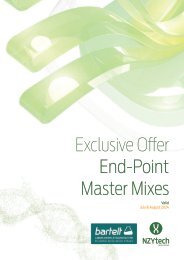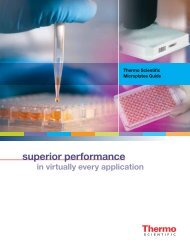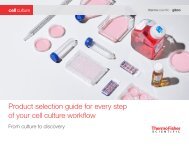PeloBiotech
Create successful ePaper yourself
Turn your PDF publications into a flip-book with our unique Google optimized e-Paper software.
www.pelobiotech.com<br />
Cell culture media play a pivotal role in establishing an environment conducive to optimal cellular growth and function.<br />
Fetal Bovine Serum (FBS), a commonly used additive, provides essential nutrients, growth factors, and hormones crucial<br />
for cell proliferation. Ethical and regulatory considerations prompt researchers to explore animal origin-free alternatives,<br />
such as Human Platelet Lysate (hPL), derived from human platelets, ensuring a consistently ethically sourced supply. To<br />
exercise even greater control, defined media exclude undefined components, offering precision in shaping culture<br />
conditions.<br />
Key components, including the buffer system for pH stability, carbon sources for energy, pH indicators for acidity level<br />
monitoring, antibiotics for contamination prevention, and metabolites like amino acids, vitamins, and minerals for<br />
nutritional support, contribute to the intricate balance. While serum-rich in nutrients introduces variability, defined media<br />
empower researchers with explicit control over each component, facilitating fine-tuning of the culture environment. This<br />
depth of understanding enables scientists to tailor media formulations to meet specific cellular requirements, fostering<br />
successful and reproducible cell culture experiments. Ensuring the sterility and quality of individual components is<br />
imperative for achieving GMP (Good Manufacturing Practice) quality in the final media, highlighting the importance of<br />
meticulous handling and stringent quality control measures.<br />
Fetal Bovine Serum (FBS)<br />
FBS is derived from the blood of fetal bovines and serves as a rich source of nutrients, growth factors, and hormones<br />
essential for cell culture. The production of FBS involves collecting blood from fetal calves during the slaughter process.<br />
After collection, the blood is processed to extract the serum, which is then subjected to filtration and heat inactivation to<br />
eliminate potential contaminants. FBS is graded based on its origin, processing methods, and the absence of contaminants.<br />
Research-grade FBS is commonly used in basic research, while GMP (Good Manufacturing Practice) grade adheres to more<br />
stringent quality control standards, making it suitable for the production of biopharmaceuticals or clinical applications.<br />
Advantages:<br />
• Rich in nutrients and growth factors, supporting a wide range of cell types.<br />
• Well-established and widely used in cell culture applications.<br />
• Enhances cell attachment, proliferation, and viability.<br />
Disadvantages:<br />
• Batch-to-batch variability can impact experimental consistency.<br />
• Concerns about ethical and regulatory issues related to its production.<br />
• Potential risk of introducing contaminants like mycoplasma.<br />
Human Platelet Lysate (hPL)<br />
HPL is an animal origin-free alternative to FBS, often chosen to address ethical concerns and regulatory restrictions. Its<br />
production involves the collection of human platelets, typically obtained from donor blood. HPL grades vary based on<br />
specific quality parameters. Fibrinogen-depleted hPL eliminates fibrinogen, reducing the risk of clot formation in cultures.<br />
Gamma-irradiated hPL undergoes irradiation to ensure sterility. These different grades cater to diverse applications, with<br />
researchers selecting the grade that aligns with their specific needs, whether it be minimizing the risk of contamination,<br />
ensuring sterility, or meeting regulatory requirements. The flexibility in hPL grades allows for customization based on the<br />
desired characteristics for specific cell culture applications. We also offer AB serum, A serum, BSA, HAS and other<br />
supplemented media with ECGS and BPE.<br />
Advantages:<br />
• Animal origin-free, addressing ethical and regulatory concerns.<br />
• Consistent composition, reducing batch-to-batch variability.<br />
• Supports cell growth and expansion comparable to FBS.<br />
Disadvantages:<br />
• Costlier compared to FBS.<br />
27
















